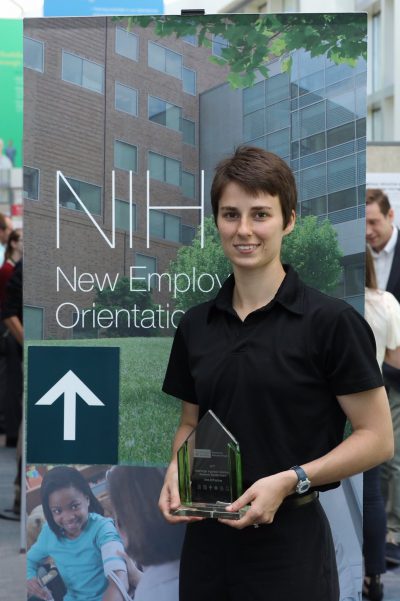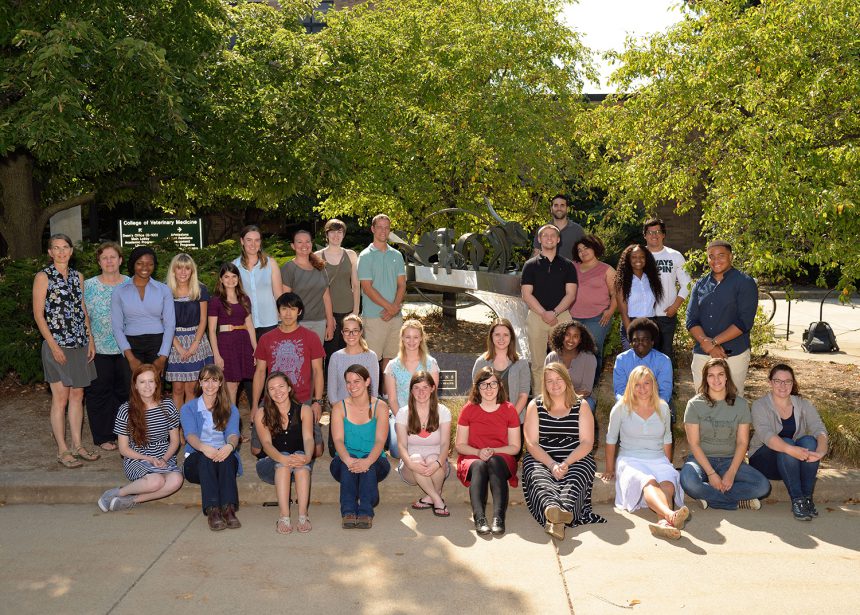The Michigan State University College of Veterinary Medicine’s Summer Research Program fosters another year of student education and career success.

On August 3–6, student participants in the College’s Summer Research Program attended the 2017 National Veterinary Scholars Symposium (NVSS) in Washington, DC. Hosted this year at the National Institutes of Health (NIH) by the National Cancer Institute (NCI) and the Association of American Veterinary Medical Colleges (AAVMC), with major support from Boehringer Ingelheim (BI) and an NIH grant to the College, the NVSS is the premier annual scientific colloquium, which showcases the research accomplishments of veterinary students completing summer research internships nationwide while exposing them to cutting-edge researchers who present in various scientific sessions throughout the Symposium.
At the NVSS, veterinary students present their research findings during their summer research internships and demonstrate ways in which veterinary scientists contribute to basic and applied biomedical research. This year’s program focused on neuroscience, conservation medicine, comparative oncology, and global health.
“After spending time with our groundbreaking researchers, our students are able to share their new findings through poster presentations and demonstrate their increased capacity in and understanding of biomedical research,” says Dr. Vilma Yuzbasiyan-Gurkan, associate dean for Research and Graduate Studies for the College and director of the Summer Research Program. “It’s an invaluable experience that we’ve seen impact our graduates for years to come as they make critical decisions in regard to their career paths.”
At this year’s Symposium, MSU had the largest number of students in attendance—41 to be exact. This group included DVM and DVM-PhD students, as well as undergraduate students participating in the College’s Biomedical Research for University Students in Health Sciences (BRUSH) Program. Also at this year’s conference, Ann DiPastina, Class of 2019 and Summer Research Program graduate, was presented the Boehringer Ingelheim Veterinary Research Scholar Award, which highlights the BI mission of exposing veterinary students to research and rewarding those who have excelled.
“Ann is exemplary of our many students who have gone on to succeed and contribute to the scientific community,” says Yuzbasiyan-Gurkan. “She’s a great inspiration for our future participants.”
DiPastina completed the Cornell Veterinary Investigator Program in August 2016. She then participated in the Cornell Leadership Program during summer 2017. For both summers at Cornell, she worked with Yrjö Gröhn of Cornell's Department of Population Medicine and Diagnostic Sciences, where she studied antimicrobial use for mastitis prevention and treatment.
“MSU’s Summer Research Program has had a significant impact on my career path,” says DiPastina. “I did not intend to pursue a career in research when I entered veterinary school, but now, I am planning to combine applied research with a clinical specialty with the goal of contributing to the effort to combat antimicrobial resistance and food insecurity, and possibly explore avenues of infectious diseases which have a significant impact on animal and human health.”
About the Summer Research Program
Since 2000, the College’s Summer Research Program has helped hundreds of students foster intellectual curiosity and appreciate the value of scientific inquiry and collaboration. The Program is currently supported by two NIH grants, as well as grants from industry, endowed funds from alumni, and College and University resources. The Summer Research Program offers students immersion in biomedical research and insights to potential career paths that they might not have considered.

Each year, the College hosts up to 30 veterinary medical students from MSU and across the country. These students conduct mentored research that contributes to a generation of new knowledge. Students are matched with mentors from a wide range of research interests, such as molecular genetics, cancer biology, and infectious diseases. During the 12-week program, students conduct research, analyze data, and present their results at MSU and at a national conference. They also write a scientific report. In addition, students participate in seminars and discussion groups that focus on responsible conduct for research and careers in science, as well as sessions on teamwork and networking. Book Club meetings featuring scientific subjects of interest hosted by various faculty add another dimension to the program. These discussions encourage deep thinking in pertinent subjects of science and society.
“The strongest components of our program are building community between undergraduate, graduate, and DVM students and their mentoring faculty, and how the program exemplifies a research trajectory that empowers our students to continuously improve,” says Yuzbasiyan-Gurkan. “These skills and experiences are critical in a research setting. They give our students the necessary exposure and drive to go forward and be successful.” The Summer Research Program is co-directed by Drs. Yuzbasiyan-Gurkan, Sue Ewart, and Linda Mansfield, with administrative support provided by Dimity Palazzola.
The BRUSH Program for Undergraduates
Because of its success with the Summer Research Program, the College expanded its offerings to undergraduate students nearly seven years ago. BRUSH offers hands-on research exposure and preparation for graduate school or professional opportunities for individuals from diverse backgrounds. Students participating in this 12-week program work on a project under the mentorship of leading scientists. They also work collaboratively with DVM students participating in the Summer Research Program, who serve as aspirational peers.
“We are training the next generation of problem solvers, critical thinkers, and independent learners, no matter their career goals,” says Dr. Susan Ewart, professor, special assistant to the Dean, and co-director of the BRUSH program. “A summer research experience can spark that intellectual curiosity, teach deeper understanding of biology, and encourage further careers in science and medicine.”
